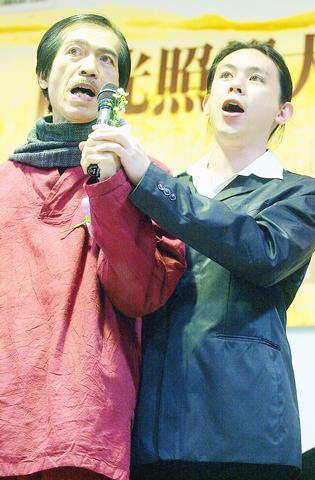Bringing a whole new meaning to the term "cross-strait affairs," a renowned Aboriginal musician yesterday released a love song he composed for a young Chinese musician he met eight years ago in Beijing.
For many artists, love is the primary muse, and this is particularly true of musician Lee Tai-shiang (

PHOTO: CHEN CHENG-CHANG, TAIPEI TIMES
Lee has never talked publicly about his own love life, letting his songs tell the story instead. Rumors about his love affairs have always accompanied his album releases.
Most fans are first attracted by the lyrics, a taste for the modern-classical style music is usually acquired later.
But once the taste for the music is acquired, the listener is hooked by the dramatic melodies and the music's spiritual qualities.
The new release once again happens amid reports of a romance, but this time it is not a mere rumor.
The new album, titled That Time I Saw You (
As usual, in this new album he composed music for poems written by famous poets like Siang Yang (
This Is a Secret is one of the few songs in which both the words and music were written by himself.
In the song, he sings "This is a secret. Nobody knows it. Because you once smiled at me. How wonderful, how amazing, when our eyes met ..."
According to Edward Chen (陳建育), producer of the album, the love story began when Lee was conducting China's Central Orchestra (中央管絃樂團) in Beijing during recording of an album that was composed by him. The young lady, in her early twenties at the time, was a cellist in the orchestra.
"He was very impressed by his encounter with her in Beijing. When he returned to Shanghai, he decided to compose some music for her. Two years ago, he decided to publish this song," said Chen.
At yesterday's launch of the album, he admitted that love was a major element in his latest work. "I just looked at her with all my heart. Then the music came out naturally," said Lee.
Having suffered from Parkinson's disease for years, and with a constantly shaking hand, Lee is not discouraged by pain. He pledged to be "true to myself."
"I have to learn to cope with my present self, instead of my past self. I have to face myself, as disabled and imperfect as I am, and try my best to present myself completely and without fear," Lee said.

MORE VISITORS: The Tourism Administration said that it is seeing positive prospects in its efforts to expand the tourism market in North America and Europe Taiwan has been ranked as the cheapest place in the world to travel to this year, based on a list recommended by NerdWallet. The San Francisco-based personal finance company said that Taiwan topped the list of 16 nations it chose for budget travelers because US tourists do not need visas and travelers can easily have a good meal for less than US$10. A bus ride in Taipei costs just under US$0.50, while subway rides start at US$0.60, the firm said, adding that public transportation in Taiwan is easy to navigate. The firm also called Taiwan a “food lover’s paradise,” citing inexpensive breakfast stalls

TRADE: A mandatory declaration of origin for manufactured goods bound for the US is to take effect on May 7 to block China from exploiting Taiwan’s trade channels All products manufactured in Taiwan and exported to the US must include a signed declaration of origin starting on May 7, the Bureau of Foreign Trade announced yesterday. US President Donald Trump on April 2 imposed a 32 percent tariff on imports from Taiwan, but one week later announced a 90-day pause on its implementation. However, a universal 10 percent tariff was immediately applied to most imports from around the world. On April 12, the Trump administration further exempted computers, smartphones and semiconductors from the new tariffs. In response, President William Lai’s (賴清德) administration has introduced a series of countermeasures to support affected

CROSS-STRAIT: The vast majority of Taiwanese support maintaining the ‘status quo,’ while concern is rising about Beijing’s influence operations More than eight out of 10 Taiwanese reject Beijing’s “one country, two systems” framework for cross-strait relations, according to a survey released by the Mainland Affairs Council (MAC) on Thursday. The MAC’s latest quarterly survey found that 84.4 percent of respondents opposed Beijing’s “one country, two systems” formula for handling cross-strait relations — a figure consistent with past polling. Over the past three years, opposition to the framework has remained high, ranging from a low of 83.6 percent in April 2023 to a peak of 89.6 percent in April last year. In the most recent poll, 82.5 percent also rejected China’s

PLUGGING HOLES: The amendments would bring the legislation in line with systems found in other countries such as Japan and the US, Legislator Chen Kuan-ting said Democratic Progressive Party (DPP) Legislator Chen Kuan-ting (陳冠廷) has proposed amending national security legislation amid a spate of espionage cases. Potential gaps in security vetting procedures for personnel with access to sensitive information prompted him to propose the amendments, which would introduce changes to Article 14 of the Classified National Security Information Protection Act (國家機密保護法), Chen said yesterday. The proposal, which aims to enhance interagency vetting procedures and reduce the risk of classified information leaks, would establish a comprehensive security clearance system in Taiwan, he said. The amendment would require character and loyalty checks for civil servants and intelligence personnel prior to